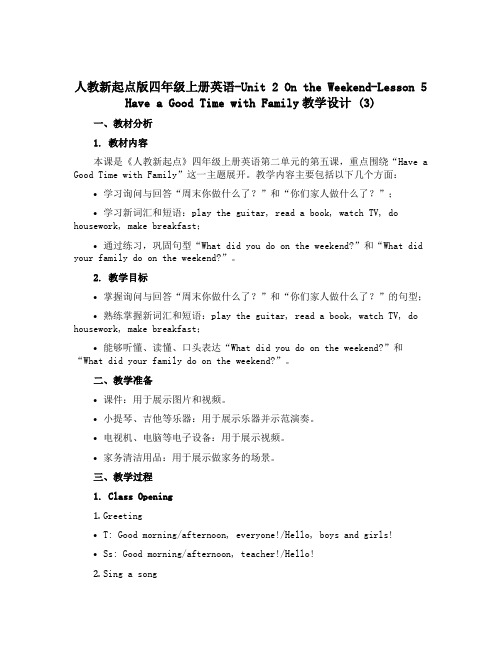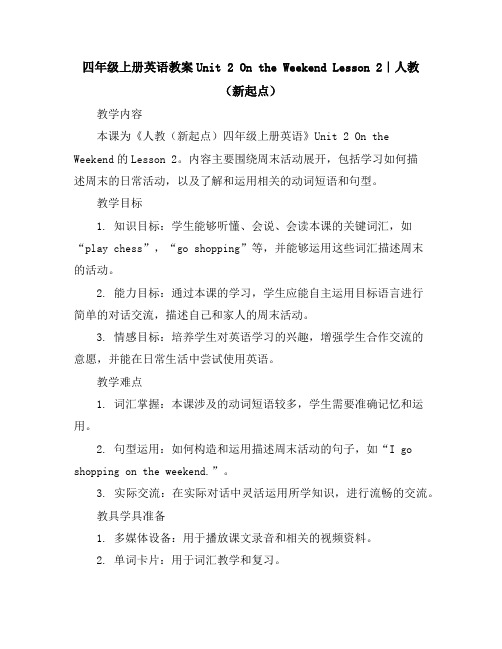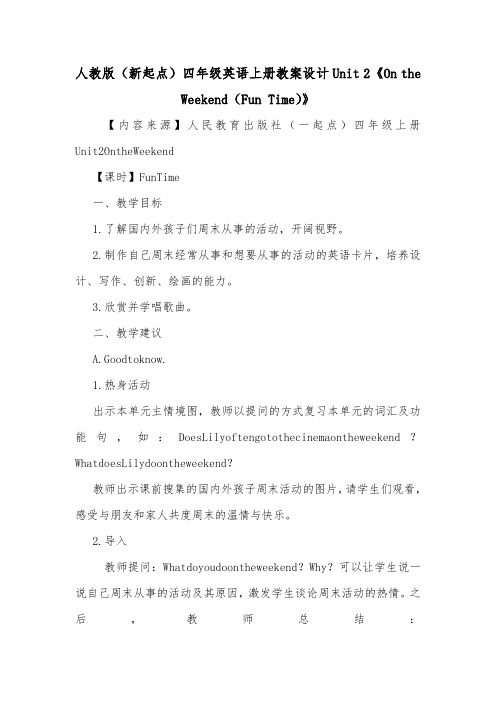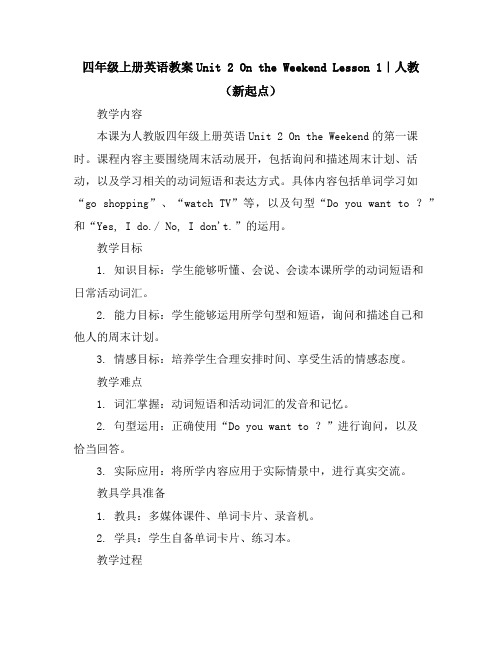四年级英语上册 Unit2 On the weekend
小学英语人教版新起点(一起)四年级上册Unit 2 On the Weekend

小学英语人教版新起点(一起) 四年级上册
市实小 清风制作
1. What do you do on the weekend?
周末,你干什么?
I often go fishing.
我常常去钓鱼。
2. often, always 的区别。
often adv. 经常,常常。 always adv. 总是,永远。 两者都表示频率,但always 表示的频率更高。
ห้องสมุดไป่ตู้ We always visit my grandparents on the weekend.
We always go to a drawing club on the weekend.
回家把今天学的对话 读给爸爸妈妈听。
1) He always get up early. 他总是早早起床。
(带有一点夸奖的意思。)
2) She often go to the cinema.
她经常去看电影。
We often pick fruits on the weekend.
I often climb a hill on the weekend.
I often play computer games on the weekend.
I always go fishing with my family.
I always go to the cinema with my parents on the weekend.
We often go fishing on the weekend.
【单元测】英语四年级上册-Unit 2 On the Weekend 人教新起点(含答案)

单元测试卷四年级英语上册Unit 2 On the Weekend人教新起点(含答案)一、判断下列单词是(T)否)(F)同类。
(10分)()1.A. always B.often C.sometimes()2.A.poor B.hope C.so()3.A.step B.dirty C.paint()4.A.morning B.afternoon C.evening()5.A. their B.my C.his二、根据图片提示,写出单词。
(20分)1._________2.____________3.______________4._____________5.____________6._____________7._______________8.______________9.___________ 10.________________三、单项选择。
(20分)()1.Do you often______?A. Climb a hillB.picking fruitC. jumping rope ()2.—Do you have eraser?—No, ______ .A. We doB.We don’tC. Here you are()3.Lily often visits _______ grandparents on the weekend.A.sheB.hisC. her()4.He often ______fishing with his father.A.goB.goesC.going()5.I often go ________cinema on the weekend.A.at theB.in theC.to the()6.—What sports ______you like?—I like ping-pong.A.areB.doC.does()7.My brother ____running.A.likeB.likesC.to like()8.What do you often do_____the weekend?A.inB.atC.on()9.He is good _______running.A.goesB.atC.to()10.They _______tennis .A.are goodB.is good atC.are good at四、看图,选择正确的选项补全句子。
人教新起点版四年级上册英语-Unit 2 On the Weekend-Lesson 5 Have

人教新起点版四年级上册英语-Unit 2 On the Weekend-Lesson 5 Have a Good Time with Family教学设计 (3)一、教材分析1. 教材内容本课是《人教新起点》四年级上册英语第二单元的第五课,重点围绕“Have a Good Time with Family”这一主题展开。
教学内容主要包括以下几个方面:•学习询问与回答“周末你做什么了?”和“你们家人做什么了?”;•学习新词汇和短语:play the guitar, read a book, watch TV, do housework, make breakfast;•通过练习,巩固句型“What did you do on the weekend?”和“What did your family do on the weekend?”。
2. 教学目标•掌握询问与回答“周末你做什么了?”和“你们家人做什么了?”的句型;•熟练掌握新词汇和短语:play the guitar, read a book, watch TV, do housework, make breakfast;•能够听懂、读懂、口头表达“What did you do on the weekend?”和“What did your family do on the weekend?”。
二、教学准备•课件:用于展示图片和视频。
•小提琴、吉他等乐器:用于展示乐器并示范演奏。
•电视机、电脑等电子设备:用于展示视频。
•家务清洁用品:用于展示做家务的场景。
三、教学过程1. Class Opening1.Greeting•T: Good morning/afternoon, everyone!/Hello, boys and girls!•Ss: Good morning/afternoon, teacher!/Hello!2.Sing a song•T: Let’s sing a song “Weekend” together.2. Review and Presentation•T: Last time we learned “On the Weekend”. Can you still remember the sentence pattern?•Ss: Yes. What did you do on the weekend?•T: Good! Today we are going to learn a song called “Have a Good Time”. Let’s watch and listen to the video first.3. Practice1.T: Now, please open your textbook and turn to page 23. Let’s read the dialogue on the page together.2.T: Alice asks Ben“What did you do on the weekend?”,what can you answer?S1: I read a book on the weekend.S2: I watched TV on the weekend.S3: I played the guitar on the weekend.3.T: What did Ben ask Alice?S1: What did your family do on the weekend?S2: Did you do your homework on the weekend?S3: Did you go to the park on the weekend?4.T: OK, let’s do a role play.–S1: What did you do on the weekend?–S2: I played the guitar on the weekend.–S1: That sounds interesting. Can you show us how to play it?–S2: Sure.–(S2 takes out the guitar and plays a simple song.)5.T: Good job! Your guitar playing is really nice. Now let’s do a survey. Walk around the classroom and ask your classmates“what did you do on the weekend?” Write down their answers.6.T: Now, let’s work in pairs. Ask your partner“What did your family do on the weekend?” and write down their answers.4. Production1.T: Let’s do a quiz. I will describe an activity, and you need to guess what it is.•The activity is about using a tool to clean the floor or the table. Answer: Do housework.•The activity is about using a stringed instrument to make music. Answer: Play the guitar.•The activity is about looking at pictures on the screen and following the story. Answer: Watch TV.•The activity is about using your eyes and mind to read a story or a book. Answer: Read a book.•The activity is about making food and eating it, usually in the morning. Answer: Make breakfast.2.T: OK, let’s sing the song “Have a Good Time” together and show your actions.5. Class Closing1.T: That’s all for today. Do you have any questions or doubts in today’s lesson?2.T: Homework:•Interview your family members“What did they do on the weekend?” and write down their answers.•Practice the new words and the dialogue on the textbook.•Review the sentence pattern“What did you do on the weekend?”。
四年级上册英语教案-Unit2OntheWeekendLesson2|人教(新起点)

四年级上册英语教案Unit 2 On the Weekend Lesson 2|人教(新起点)教学内容本课为《人教(新起点)四年级上册英语》Unit 2 On the Weekend的Lesson 2。
内容主要围绕周末活动展开,包括学习如何描述周末的日常活动,以及了解和运用相关的动词短语和句型。
教学目标1. 知识目标:学生能够听懂、会说、会读本课的关键词汇,如“play chess”,“go shopping”等,并能够运用这些词汇描述周末的活动。
2. 能力目标:通过本课的学习,学生应能自主运用目标语言进行简单的对话交流,描述自己和家人的周末活动。
3. 情感目标:培养学生对英语学习的兴趣,增强学生合作交流的意愿,并能在日常生活中尝试使用英语。
教学难点1. 词汇掌握:本课涉及的动词短语较多,学生需要准确记忆和运用。
2. 句型运用:如何构造和运用描述周末活动的句子,如“I go shopping on the weekend.”。
3. 实际交流:在实际对话中灵活运用所学知识,进行流畅的交流。
教具学具准备1. 多媒体设备:用于播放课文录音和相关的视频资料。
2. 单词卡片:用于词汇教学和复习。
3. 情景图:展示不同的周末活动,帮助学生理解和运用目标语言。
4. 练习册:用于课堂练习和课后作业。
教学过程1. 热身活动:通过简单的日常对话,复习上节课的内容,引入本课的主题。
2. 词汇教学:利用单词卡片和情景图,教授本课的新词汇,强调发音和用法。
3. 句型练习:通过听力练习和角色扮演,让学生熟悉并掌握描述周末活动的句型。
4. 小组活动:学生分组,用所学词汇和句型讨论并分享自己和家人的周末活动。
5. 成果展示:每组选取代表,向全班同学展示讨论成果。
板书设计本课的主要词汇和短语。
描述周末活动的关键句型。
课堂练习的示例。
作业设计1. 听力练习:听课文录音,跟读并模仿发音。
2. 书面练习:完成练习册中与本课相关的练习题。
人教版(新起点)四年级英语上册教案设计Unit 2《On the Weekend(Fun Time)》

人教版(新起点)四年级英语上册教案设计Unit 2《On theWeekend(Fun Time)》【内容来源】人民教育出版社(一起点)四年级上册Unit2OntheWeekend【课时】FunTime一、教学目标1.了解国内外孩子们周末从事的活动,开阔视野。
2.制作自己周末经常从事和想要从事的活动的英语卡片,培养设计、写作、创新、绘画的能力。
3.欣赏并学唱歌曲。
二、教学建议A.Goodtoknow.1.热身活动出示本单元主情境图,教师以提问的方式复习本单元的词汇及功能句,如:DoesLilyoftengotothecinemaontheweekend?WhatdoesLilydoontheweekend?教师出示课前搜集的国内外孩子周末活动的图片,请学生们观看,感受与朋友和家人共度周末的温情与快乐。
2.导入教师提问:Whatdoyoudoontheweekend?Why?可以让学生说一说自己周末从事的活动及其原因,激发学生谈论周末活动的热情。
之后,教师总结:Youoftenhaveagoodtimeontheweekend.WhataboutthechildrenfromC anada,Australia,EnglandandotherpartsofChina?Whatdotheydoontheweekend?Tip:建议教师出示国旗,帮助学生认识四个国家的英文名称。
3.听一听、看一看(1)自由交谈。
教师出示四幅图片,请学生用中文交流一下对这四项活动的了解。
(2)视听理解。
教师播放A项录音或配套光盘,逐一展示图片,学生借助图片理解录音内容。
(3)重点讲解。
逐一讲解四项活动,重点讲解学生可能理解困难的部分信息,如:gorockclimbing,Frisbee,theNationalRailwayMuseum 等。
Tip:教师可以事先查找一下这些活动的背景知识,必要时介绍给学生,以开阔眼界。
以下背景知识仅供参考。
四年级上册英语教案-Unit 2《On the Weekend》(Story Time)|人教新起点

四年级上册英语教案-Unit 2《On the Weekend》(StoryTime)|人教新起点一、教学目标1.熟悉有关周末活动的词汇及句型,如go fishing,play basketball等;2.了解小猪在周末的活动,并能简单描述。
二、教学重点1.学习并掌握周末活动的相关词汇及句型;2.理解小猪在周末的活动,提高对故事的听、说、读的能力。
三、教学方法1.以小组形式进行词汇小游戏,增强学生记忆力;2.进行语言环境的营造,让学生置身于英语环境中;3.以听、说、读综合的方式,提高学生英语运用技能。
四、教学过程1.热身启动(5分钟)在黑板上画四个方框,分别用图片代替动物或物品。
用英语过一遍所画的物品,让学生猜猜每个方框所代表的物品是什么。
2.学习新词汇(10分钟)老师展示新的周末活动的词汇,如go fishing,play basketball等,学生跟读。
3.小组活动(20分钟)将学生分为四人一组,由组内一人说出一个周末活动,该组其他三人要利用今天所学的词汇或句式描绘并得出正确活动名称。
每组活动时间5分钟,最终确定获胜组。
4.讲故事并理解(25分钟)老师讲解小猪在周末的活动,学生认真听故事并做好记录。
然后老师提出问题让学生回答,如:•What did the pig do on the weekend?•Did he go swimming?•Did he go hiking?5.读故事并分组演示(30分钟)将学生分成两人一组,一人讲故事,一人演示,反之亦然。
通过这样的活动,让学生更好地理解故事内容并提高口语表达能力。
6.课后作业(5分钟)让学生回家后,将所学词汇和句型写在本子上,并试着复述小猪在周末的活动。
五、板书设计新词汇•go fishing•play basketball故事内容On the weekend, the pig went fishing with his father. He caught abig fish and felt very happy.六、教学心得本节课主要介绍了有关周末活动的英语词汇及句型。
四年级上册英语教案-Unit 2《On the Weekend》(Let’s Spell)|人教新起

四年级上册英语教案-Unit 2《On the Weekend》(Let’sSpell)|人教新起点一、教学目标1.能够正确拼读单词weekend、Saturday和Sunday。
2.能够正确书写并默写单词weekend、Saturday和Sunday。
3.能够用正确的语音和语调能流利地发音。
4.通过小组交流合作,提高学生的听说读写能力。
二、教学重难点1.重点:掌握单词weekend、Saturday和Sunday,并正确拼读、书写。
2.难点:避免中式英文口音,注意正确的语音和语调。
三、教学内容与步骤第一步:导入1.让学生回顾学习《On the Weekend》这首歌曲的内容,提问:What do you usually do on the weekend? Do you like to play on Saturday or Sunday?2.引导学生描述周末的活动,并让他们感受周末的悠闲愉快氛围。
第二步:学习拼读单词1.准备一份单词卡片(weekend、Saturday和Sunday),让学生看图、听音用正确的语音和语调模仿发音,边学边拼读。
2.手抄单词,跟读教师读音,学生自行朗读。
3.分组练习。
将学生分组并要求轮流回答教师出示的单词卡片,以此巩固单词拼读技能和加强合作学习的能力。
第三步:书写单词1.将单词卡片挂在黑板上,教师板书单词的字母,让学生跟着读并抄写单词。
2.学生以小组为单位,回去完成单词本的练习。
单词本所选用的字体要大而醒目。
3.检查作业。
表扬书写规范、字迹工整的学生,并指导错误学生进行改正。
第四步:互动交流1.根据学生兴趣爱好,教师引导学生进行小组交流互动。
2.让孩子们停下脚步,在美丽的校园中欣赏景色、体验学习之乐,促进学生之间的沟通和合作。
四、课堂小结1.学生通过字母形态、语音和语调的锻炼,掌握了单词weekend、Saturday和Sunday的正确拼读和书写。
2.学生体验了发音的重要性,避免中式英文口音的出现,提高了英语口语能力。
四年级上册英语教案-Unit2OntheWeekendLesson1|人教(新起点)

四年级上册英语教案Unit 2 On the Weekend Lesson 1|人教(新起点)教学内容本课为人教版四年级上册英语Unit 2 On the Weekend的第一课时。
课程内容主要围绕周末活动展开,包括询问和描述周末计划、活动,以及学习相关的动词短语和表达方式。
具体内容包括单词学习如“go shopping”、“watch TV”等,以及句型“Do you want to ?”和“Yes, I do./ No, I don't.”的运用。
教学目标1. 知识目标:学生能够听懂、会说、会读本课所学的动词短语和日常活动词汇。
2. 能力目标:学生能够运用所学句型和短语,询问和描述自己和他人的周末计划。
3. 情感目标:培养学生合理安排时间、享受生活的情感态度。
教学难点1. 词汇掌握:动词短语和活动词汇的发音和记忆。
2. 句型运用:正确使用“Do you want to ?”进行询问,以及恰当回答。
3. 实际应用:将所学内容应用于实际情景中,进行真实交流。
教具学具准备1. 教具:多媒体课件、单词卡片、录音机。
2. 学具:学生自备单词卡片、练习本。
教学过程1. 热身活动:播放英文歌曲,营造英语学习氛围。
2. 新课导入:展示图片,引导学生谈论周末活动。
3. 词汇教学:借助单词卡片,学习新词汇。
4. 句型练习:通过角色扮演,练习询问和描述周末计划。
5. 小组活动:分组讨论,设计周末计划。
6. 汇报展示:各小组汇报周末计划,全班交流。
板书设计板书设计简洁明了,突出本课重点词汇和句型。
通过图表、色块等方式,直观展示周末活动的安排和询问应答过程。
作业设计1. 书面作业:完成课后练习,巩固词汇和句型。
2. 口头作业:与家人或朋友用英语讨论周末计划。
3. 拓展作业:收集更多关于周末活动的词汇和表达方式。
课后反思课后反思将围绕教学目标达成度、教学方法的有效性、学生学习状态等方面进行。
教师将根据学生的反馈和学习效果,调整教学策略,以提高教学效果。
- 1、下载文档前请自行甄别文档内容的完整性,平台不提供额外的编辑、内容补充、找答案等附加服务。
- 2、"仅部分预览"的文档,不可在线预览部分如存在完整性等问题,可反馈申请退款(可完整预览的文档不适用该条件!)。
- 3、如文档侵犯您的权益,请联系客服反馈,我们会尽快为您处理(人工客服工作时间:9:00-18:30)。
I clean my teeth every day.
He visits his grandparents every week.
She goes to the supermarket every month.
We climb a hill every year.
They always play computer games.
climb
[klaɪm] v.爬
climb the tree
hill [hɪl] n.小山
mountain [ˈmaʊntən]
n.山;山脉
climb a hill
pick
[pɪk] v.采摘
pick apples
pick fruit
club [klʌb] n.俱乐部、社团
go to a drawing club
一般现在时
• 定义: 经常性、习惯性、反复性的动作
I go to school every day.
现存状态
I’m a teacher and you’re a student.
客观真理与事实
The sun rises in the east.
I can swim.
He gets up at six o’clock in the morning. (经常性……)
没有be动词和情态动词can的,就找助动词do和does 来帮助。(单三用does,其余人称全用do)
He is my father. He isn’t my father.
I can climb a hill. I can’t climb a hill.
Is he your father?
Yes, he is.
go skiing
I like skiing.
rock
[rɒk] n.岩石 go rock climbing
feel [fiːl] v.感觉 I feel hot.
scary ['skeərɪ] adj.吓人的;可怕的
I feel scary.
safe [seɪf]
adj.安全的
I often go rock climbing with my friends.
I like books. I like reading books. I like to read books.
I like computer games.
I like playing computer games. I like to play computer games.
ski [skiː] v.滑雪
一般将来时
一般现在时
时间
时态: 不同的时间发生的动作就用不同的时态 动作发生在过去就用 过去时 动作发生在将来就用 将来时 动作发生在现在就用
现在进行时
一般现在时
I am a teacher.
We are good at Englsih. Binbin often plays ping-pong with his father. Luke can run. We like English.
Andy is 9 years old. (现存状态 \事实)
The sun rises in the east. (客观真理) They can sing and dance.
(事实)
I often run home from school. (经常性……)
结构:
主语 + V + 其它 主语(单三)+ Vs + 其它
I teach English.
dancer ['dɑːnsə] ['dæ nsɚ] n.舞蹈家
My sister is a dancer.
singer teacher worker reader cleaner player farmer painter writer runner swimmer winner
没有be动词和情态动词can的,就找助动词do和does 来帮助。(单三用does,其余人称全用do)
怎样把含有be动词的句子变成
This is a horse.
一般疑问句?
This isn’t a horse.
把be动词提前,并且大写首字母,
其余照写,句号变问号,降变升调。 (我变你,我们变你们,我的变你的, 我们的变你们的) 怎样把含有be动词的句子变成否定句? 在be动词后加 “not”
Yes, he can.
No, he can’t. What can he do?
句号变问号,降调变升调。
怎样把含有情态动词can的句子变成定句? 在can后加not cannot can’t
I like tomatoes.
Do you like tomatoes?
Yes, I do.
No, I don’t. What do you like?
grandparents
grandfather grandmother
parents
mother father
grandparents ['græ n(d)peərənts] n.(外)祖父母
visit ['vɪzɪt] v.拜访、参观
visit Shenyang
visit my friends
step [step] v.踩 A woman steps on my shoe.
paint [peɪnt] v.画画(颜料画) v.涂颜色 n.颜料
dirty ['dɜːtɪ]
adj.脏的
I step in some dirty water near their house.
poor [ pʊə] adj.可怜的; 贫穷的
No, he isn’t. Who is he?
Can you climb a hill?
Yes, I can.
No, I can’t. What can you do?
I like tomatoes. I don’t like tomatoes.
He likes potatoes. He doesn’t like potatoes.
wants a shirt and Lily _______ wants a dress. (want) 3. Bill _______ rides a bike (ride) 4. My mother _____
and my father swims _____ swim. (swim)
5. We _____ get up at six and they _____ get up at seven. (get)
visit one’s grandparents 看望(外)祖父母
Visit my grandparents Visit your grandparents
Visit his grandparents
Visit her grandparents Visit our grandparents
Visit their grandparents
visit one’s grandparents
climb a hill
pick fruit
go to a drawing club
go to the cinema play computer games
go fishing on the weekend
I play football every day. 一般现在时 I am playing football now. 现在进行时 I’m going to play football tomorrow.
I like cats. He likes cats.
like red but he _____ likes black. (like) 1. I _____ play football in the morning 2. They _____
but Andy plays _____ football in the afternoon. (play)
时间状语:
every day \ week \ month \ year \ Monday \ spring …
always \ usually \ often \ sometimes \ never
频率副词
always [‘ɔːlweɪz] adv.总是 usually [ˈjuːʒʊəlɪ] adv.通常
It often feels scary, but it is very safe.
walk [wɔːk] v.走路、步行
go for a walk
I walk to school every day.
beach
[biːtʃ] n.海滩 on the beach I often go for a walk on the beach.
lover
dancer
so adv.那么;所以
I hope tomorrow is not so bad.
I also like drawing, so I often go to a drawing club on Sunday.
like sth like doing sth like to do sth
Do you like tomatoes?
Yes, I do. No, I don’t.
Does he like potatoes?
Yes, he does. No, he doesn’t.
What do you like?
What does he like?
I often go to the cinema on the weekend.
